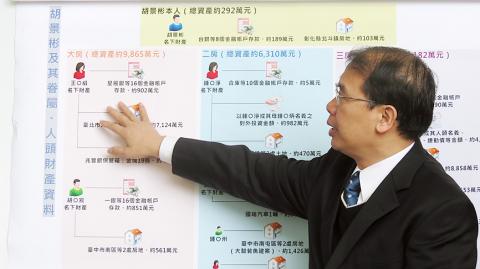|
High Court judge
indicted on charges of corruption
FINANCIALLY SECURE: Prosecutors said they seized
NT$27 million in cash and 500 bottles of high-end liquor from the judge¡¦s NT$300
million residence
By Rich Chang / Staff reporter

Special Investigation Division
Director Lin Fong-wen explains a chart showing the property of Hu Ching-pin, a
High Court judge indicted on corruption charges, at a press conference in
Greater Taichung yesterday.
Photo: Yang Cheng-chun, Taipei Times
Prosecutors yesterday announced the
indictment of Hu Ching-pin (J´º±l), a judge at the Taiwan High Court¡¦s Greater
Taichung branch, on charges of corruption and owning property of unknown
provenance.
The Special Investigation Division (SID) of the Supreme Court, which is in
charge of the case, said Hu owns a property worth about NT$300 million (US$10
million) obtained through unidentified sources.
Prosecutors said it was impossible that Hu had earned the money to buy the
property from his judge¡¦s salary.
The SID said it received a complaint in 2010 alleging that Hu asked for a bribe
of NT$4.5 million from a defendant in a case he was handling, and launched an
investigation in November that year.
Hu was arrested in August this year and has been detained by the Taichung
District Court ever since.
SID prosecutors seized NT$27 million in cash from his residence.
They also confiscated about 500 bottles of high-end liquor that prosecutors said
could have been given to Hu as bribes.
Prosecutors said that as a High Court judge, Hu earns an annual salary of more
than NT$2 million, but he has a wife, two mistresses and six children to
support.
Prosecutors said Hu spent more than NT$500,000 per year to support his three
families.
They also suspect that Hu¡¦s wife and mistresses are guilty of money laundering.
They added that Hu¡¦s wife owns several properties in Taipei, one of his
mistresses owns more than NT$60 million in property and the second mistress has
assets worth NT$170 million.
Prosecutors said one of Hu¡¦s mistresses, Huang Yueh-chan (¶À¤ëÃÊ), was also
indicted on suspicion of involvement in bribery.
Hu first faced criminal charges in 1996 for investing in suspicious banking
practices.
After charges were filed against him, he was transferred from Taichung to Tainan
and suspended from office for three years by the Judicial Yuan.
He was allowed to return to the bench in 2000 because his case was still under
appeal.
He lost that appeal in 2001, but was retained in his post.
Lawyer Chen Po-wen (³¯³Õ¤å), who had served as a judge at the Taipei District
Court, said the reason the government paid much higher wages to judges than to
other types of public servants was to prevent them from succumbing to the
temptation of accepting bribes and making unfair judgements.
¡§Judges are paid a minimum monthly salary of NT$150,000, which may not be enough
to be rich, but is sufficient to be financially secure¡K However, some of the
judges¡¦ failure to apply the same moral standards has led to criticism that the
judiciary is a place ¡¥where the rich live and the poor die,¡¦¡¨ Chen said.
Kao Jung-chih (°ªºa§Ó), a lawyer and office director for the Judicial Reform
Foundation, accused the Judicial Yuan of being too lenient in Hu¡¦s case.
¡§The Judicial Yuan only suspended Hu when it should have dismissed him, allowing
a corrupt judge to do nothing while receiving half of his pay. The system is in
desperate need of a complete overhaul,¡¨ Kao said.
Additional reporting by staff writer
|
![]()
![]()
![]()